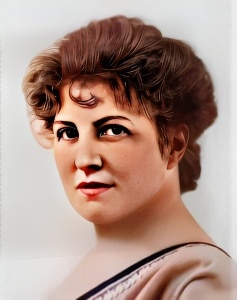 Olive Thomas, a name that shone brightly in the early years of American cinema, was a talented actress and a symbol of the Roaring Twenties.
Olive Thomas, a name that shone brightly in the early years of American cinema, was a talented actress and a symbol of the Roaring Twenties.
Born on October 20, 1894, in Charleroi, Pennsylvania, she embarked on a brief yet impactful career in the film industry. Her life, marked by ambition and tragedy, left an enduring legacy in the history of early Hollywood.
Thomas’s journey into the world of entertainment began with a career as a successful artists’ model and a Ziegfeld Follies showgirl. Her striking beauty, characterized by delicate features and a flapper-style bobbed haircut, made her an iconic figure of the era. This charm translated seamlessly to the silver screen, where she quickly gained recognition as a talented actress.
One of Olive Thomas’s early successes was her work in silent films, a medium that relied heavily on visual storytelling. Her talent for captivating audiences through her performances was evident in her roles. In 1916, she signed a contract with the Triangle Film Corporation, a significant film studio of the time, which launched her career as a film actress.
Thomas’s journey into stardom was propelled by her portrayal of the quintessential flapper in “ The Flapper” (1920), directed by Alan Crosland. The film epitomized the spirit of the Roaring Twenties, capturing the rebelliousness of a generation that rejected traditional norms. Her character, Genevieve “Ginger” King, was a small-town girl sent to a finishing school in the city, where she challenges the strict rules and embarks on a series of misadventures. The film resonated with young women of the era who sought independence and a break from societal constraints.
While “ The Flapper” was a significant milestone in her career, it was her personal life that garnered considerable attention. Thomas’s marriage to Jack Pickford, the younger brother of famed silent film star Mary Pickford, brought her into the public eye. Their relationship was marred by drama and scandals, reflecting the tumultuous nature of celebrity life in the 1920s.
Tragically, Olive Thomas’s promising career and personal life came to a devastating end. In 1920, while in Paris with her husband, she accidentally ingested mercury bichloride, mistaking it for medication. Despite attempts to save her life, she passed away at the age of 25. Her untimely death sent shockwaves through the film industry and marked the end of an era.
Olive Thomas’s legacy endures through her work in silent cinema and her status as an emblematic figure of the Roaring Twenties. Her performances in films like “ The Flapper” captured the spirit of the era and made her an icon of the time. Although her life was tragically short, she left an indelible mark on the early days of Hollywood, contributing to the evolving roles of women in society and the changing cultural landscape of the 1920s. Olive Thomas remains a celebrated and remembered figure of the silent film era.
Loading live eBay listings...




